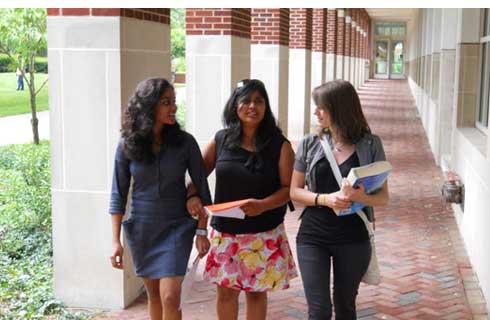理学士(荣誉)生态与保护生物学
BSc (Hons) Ecology and Conservation Biology

学历文凭
Bachelor Degree with Honours

专业院系
Department of Animal and Plant Sciences

开学时间

课程时长

课程学费

国际学生入学条件
AAB
including Biology and a second science
A Levels plus additional qualifications , ABB, including Biology and a second science plus B in the EPQ, ABB, including Biology and a second science plus B in Core Maths
International Baccalaureate , 34, 6, 5 in Higher Level Biology and a second science
BTEC , DD in Applied Science (with Distinctions in all Biology units if Biology not offered at A Level) plus A in an A Level science
Scottish Highers plus 1 Advanced Higher , AAABB, including a science subject plus B in Biology
Welsh Baccalaureate plus 2 A Levels , B plus AA in Biology and a second science
Access to HE Diploma , 60 credits overall in a Science Subject with 45 at level 3 including 36 credits at Distinctions to include Biology and a second science, and 9 credits at Merit. Applicants are considered individually.
Mature students - explore other routes for mature students
English language requirements ,
You must demonstrate that your English is good enough for you to successfully complete your course. For this course we require: GCSE English Language at grade 4/C, IELTS grade of 6.5 with a minimum of 6.0 in each component, or an alternative acceptable English language qualification toefl ibt - Overall score of 88 with a minimum of 19 in Listening, 20 in Reading, 22 in Speaking and 19 in Writing
We do not accept the TOEFL paper-based test, or MyBest scores
IDP—雅思考试联合主办方

雅思考试总分
6.5
- 雅思总分:6.5
- 托福网考总分:88
- 托福笔试总分:160
- 其他语言考试:Pearson Test of English Academic (PTE Academic or PTE Academic UKVI) - Overall score of 61 with a minimum of 56 in each component
CRICOS代码: C180
申请截止日期: 请与IDP联系 以获取详细信息。
课程简介
This course explores how humans, animals and plants interact with each other and their environment, and how this determines their abundance, distribution and the biodiversity we see on the planet. You'll learn about how humans impact ecological interactions, the climate crisis, biodiversity and sustainability, as well as what we can do to manage natural resources in the face of changing environments.<br><br>Alongside your specialist ecology and conservation modules, from your first year you'll have the flexibility to study topics across the breadth of biology to complement your knowledge. Topics range from plant science, biotechnology and zoology, to neuroscience, genetics and physiology. This flexibility allows you to study ecology and conservation in greater depth, broaden your interests or even switch to another biosciences degree programme.<br><br>No matter what modules you choose to study, you'll develop the practical laboratory and transferable skills that make our graduates attractive to employers including project management, problem solving, communication skills and data analysis.
相关申请
 预科
预科 奖学金
奖学金 实习机会
实习机会 在校学习
在校学习 跨境学习
跨境学习 校园授课-线上开始
校园授课-线上开始 在线/远程学习
在线/远程学习
开学时间&学费
学费信息仅供参考,请与IDP联系以获取详细信息
| 开学时间 | 时长 | 学费 | 地点 |
|---|
学校排名

世界排名106
数据源:
泰晤士高等教育世界大学排名
关于谢菲尔德大学

谢菲尔德大学是一个一流的研究型大学,在全球享有盛誉。该校是著名的罗素集团成员,名列全球第92位、英国第15位(2026年QS世界大学排名)。来自各种背景的学生将在谢菲尔德享受世界一流的教育。谢菲尔德有50多万人口,是个蓬勃发展的文化和工业中心。谢菲尔德是英国第四大城市,位于英国中心地带,是学生游览英国和欧洲的理想基地。从谢菲尔德乘火车两个小时便可到达伦敦,一小时可到达曼彻斯特。谢菲尔德大学拥有一个庞大的国际学生群体,因优质的教学和世界一流的研究而闻名。研究人员热衷于解决当今世界所面临的最大挑战。该校的尖端研究成果不仅影响着英国及全球的政策,对该校一系列学科的教学也发挥着作用。谢菲尔德大学有来自世界各地150个国家的3万多名学生。该校因紧密团结、温馨友好的校园社区而闻名,其学生会是公认的英国最好的学生会之一,在''2025年英国全国学生调查''中名列英国榜首。学生会提供各种俱乐部和社团、社交活动以及志愿活动机会,让学生获得更好的求学体验。谢菲尔德大学也因为学生提供极好的求学生活而世界闻名。
本校相关课程

工学士(荣誉)软件工程
学历文凭
Undergraduate Masters
开学日期
课程费用总额


工学学士(荣誉)软件工程
学历文凭
Bachelor Degree with Honours
开学日期
课程费用总额


社会学学士(荣誉)学位
学历文凭
Bachelor Degree with Honours
开学日期
课程费用总额


理学学士(荣誉)学位
学历文凭
Bachelor Degree with Honours
开学日期
课程费用总额


文学士(荣誉)俄罗斯和政治
学历文凭
Bachelor Degree with Honours
开学日期
课程费用总额


政治与社会学(荣誉)文学士学位
学历文凭
Bachelor Degree with Honours
开学日期
课程费用总额

其他相关课程

生物医学学士
 皇家墨尔本理工大学
皇家墨尔本理工大学学历文凭
Bachelor Degree
开学日期
课程费用总额


哲学硕士-生物医学和生物化学
 澳大利亚国立大学
澳大利亚国立大学学历文凭
Masters Degree (Research)
开学日期
课程费用总额


生物医学学士
 詹姆斯·库克大学
詹姆斯·库克大学泰晤士高等教育世界大学排名:361
学历文凭
Bachelor Degree
开学日期
课程费用总额


理学学士(海洋生物学)
 弗林德斯大学
弗林德斯大学泰晤士高等教育世界大学排名:307
学历文凭
Bachelor Degree
开学日期
课程费用总额


理学学士-海洋生物学(荣誉学位)
 弗林德斯大学
弗林德斯大学泰晤士高等教育世界大学排名:307
学历文凭
Bachelor Degree with Honours
开学日期
课程费用总额


城市与环境规划学士/海洋生物学理学学士
 格里菲斯大学
格里菲斯大学泰晤士高等教育世界大学排名:258
学历文凭
Dual Degree
开学日期
02 March 2026
课程费用总额
AUD 167,500










 英国
英国